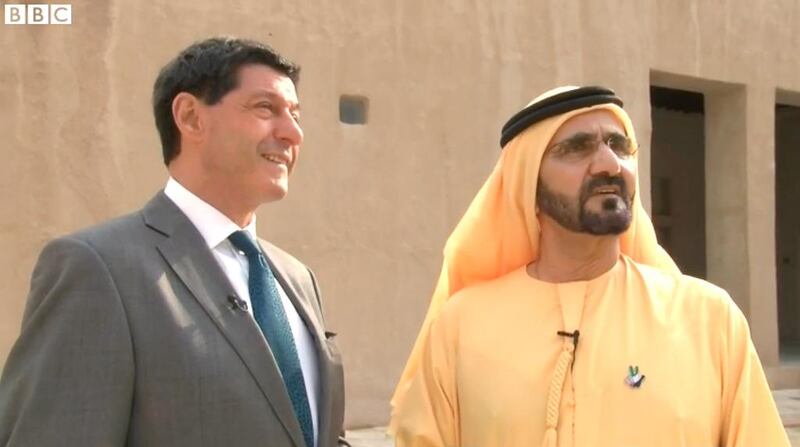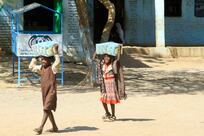DUBAI // Sheikh Mohammed bin Rashid has spoken about the UAE’s legal system and human rights record, together with political issues in the region in a wide-ranging interview with BBC World News.
Speaking to the BBC's Jon Sopel, Sheikh Mohammed, the Prime Minister and Ruler of Dubai, discussed the Syrian conflict and political developments in Egypt.
Sheikh Mohammed told Sopel in a recorded interview in Dubai on Sunday that the UAE would “help but not interfere” in the Syrian conflict.
He had been asked if the UAE would follow the example of Qatar and become involved with resistance groups in Syria.
“We are supporting the people in Jordan or Turkey, we are helping those but the free army you don’t know, because there’s some extremists, and you don’t know how many groups there are. You hear that some groups are fighting each other,” said Sheikh Mohammed.
“Maybe Qatar have a reason or a vision, but here, we don’t want to interfere with other people, we should help but not interfere.”
He said that while the Syrian president Bashar Al Assad could stay in power for some time, his eventual removal was a certainty.
“Assad will take a long time, but if you kill your people you can’t stay... eventually he will go,” he said.
Sheikh Mohammed said the UAE would establish diplomatic relations with Israel if the Israelis reached a peace deal with the Palestinians.
“We will do everything with Israel – we will trade with them and we will welcome them – but sign the peace process,” he said.
The future of Egypt was another topic of discussion during the interview.
Sheikh Mohammed said Egypt was better off without the former president, Mohamed Morsi.
“Much better and I tell you why … I said they would last only one year then the people and the army would sort that out.”
The Prime Minister also discussed the forthcoming presidential election in Egypt. In remarks later clarified in a statement from his office, he said Gen Abdel Fattah El Sisi, the Egyptian military chief who has hinted that he might run for the presidency, should not run for election while still in the military, but his candidacy as a civilian was a matter for him and the Egyptian people.
Sopel also asked Sheikh Mohammed about the UAE’s human rights record.
“We have a law, like when we cracked on the Muslim Brotherhood, because if they want to live and stay and work, they are OK, if they want to go extremes, we have a law for that,” he said.
On the release last week of the American prisoner who was jailed for a video mocking youth culture, the Dubai Ruler agreed his treatment had not been fair.
“We try to change it. We are not perfect and we try to change it. Any mistakes, we go in and try to change it. We’re not perfect, but we are doing our best,” said Sheikh Mohammed.
Another topic was the incident last year at his Godolphin horseracing stables in England, when trainer Mahmood Al Zarooni was banned for eight years by the British Horseracing Authority for doping horses.
“I was shocked,” Sheikh Mohammed said. “Really … they gave him eight years and I gave him a lifetime. Finished … he will never come near my horses … he doped them not for racing, but for treatment long term.”
In a separate report on the BBC website, Sheikh Mohammed is shown welcoming the TV crew to his ancestral home in Shindagah, which is now a museum. At the time of his childhood, there was no electricity and water in the compound overlooking the Dubai Creek.
The Dubai Ruler is shown meeting museum visitors.
While driving in Sheikh Mohammed’s Mercedes along Sheikh Zayed Road, Sopel asks if Sheikh Mohammed had a vision for Dubai’s transformation from early on in his life.
“I was lucky enough, I travelled with my father to Europe, England,” said Sheikh Mohammed. “And always my dream saying, they have roads and they have buildings and flags and, to me, that was my dream, when we have that,” he said.
The interview was broadcast on BBC World News on Monday.
vtodorova@thenational.ae






